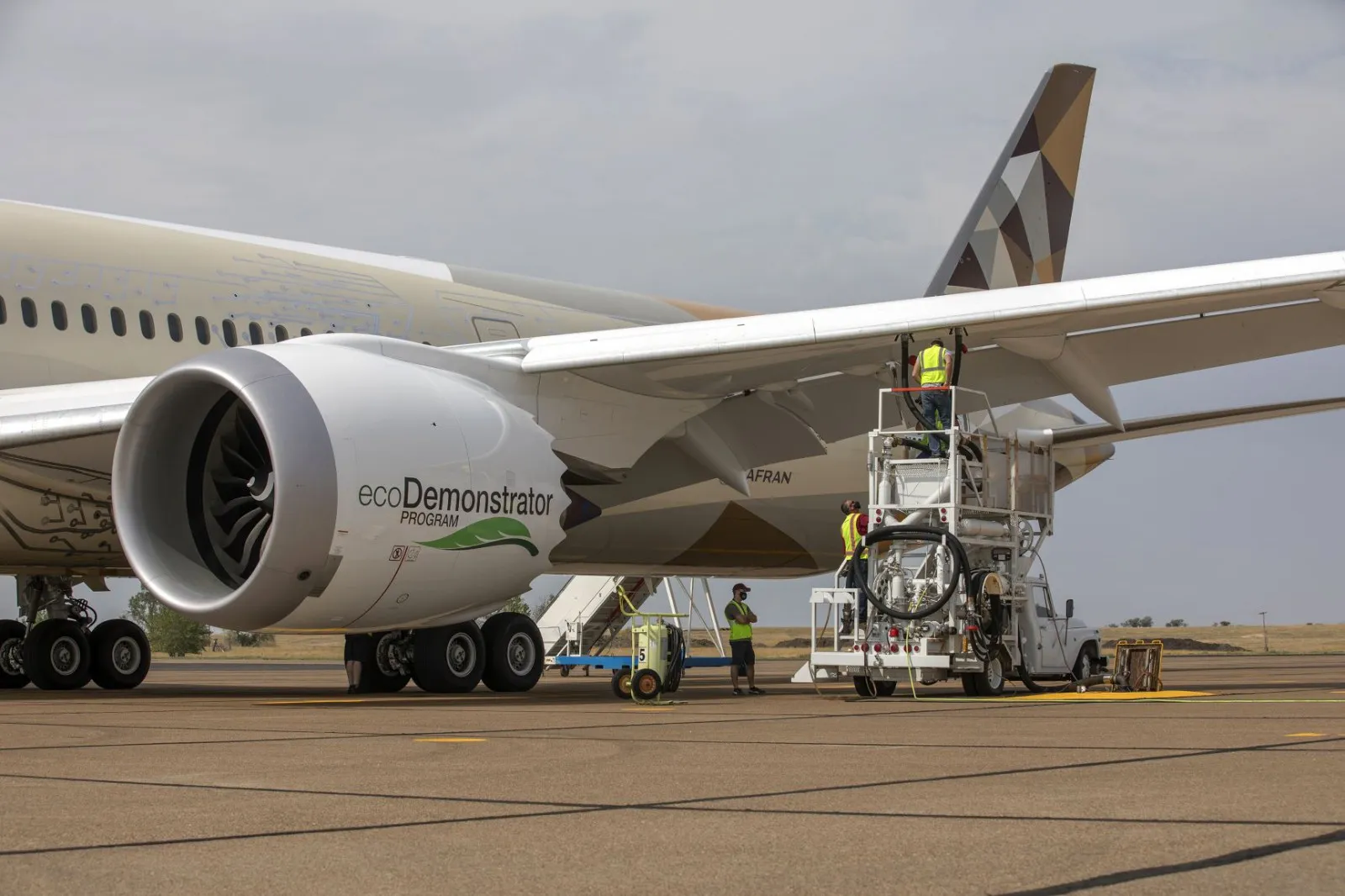
Etihad Airways & Boeing complete eco flights with special fuel
Sep 14, 2020

Etihad Airways and Boeing have collaborated on a pioneering initiative to enhance sustainable aviation through the implementation of complete eco flights. This program utilizes specially developed sustainable aviation fuel, significantly reducing carbon emissions during flights. By integrating advanced technologies and operational efficiencies, the partnership aims to demonstrate a commitment to environmental stewardship while maintaining high safety and service standards. The eco flights not only showcase innovative fuel solutions but also promote awareness of sustainable practices within the aviation industry, paving the way for a greener future in air travel and inspiring other airlines to adopt similar eco-friendly measures.
Etihad Airways, the national airline of the United Arab Emirates, has taken a significant step towards sustainability by partnering with Boeing to complete eco-flights utilizing special fuel. This initiative not only underscores the airline's commitment to reducing its carbon footprint but also showcases advancements in aviation technology. The collaboration highlights the airline's dedication to sustainability while paving the way for future innovations in aviation fuel.
Understanding Eco Flights
Eco flights are designed to minimize environmental impact by optimizing fuel consumption and reducing emissions. Etihad Airways and Boeing's eco flights leverage a sustainable aviation fuel (SAF) that is derived from renewable resources. This biofuel can significantly lower greenhouse gas emissions compared to traditional jet fuels.
Benefits of Sustainable Aviation Fuel
There are several advantages to utilizing sustainable aviation fuel, including:
- Reduction in Carbon Emissions: SAF can reduce lifecycle carbon emissions by up to 80% compared to conventional jet fuel.
- Compatibility: It can be blended with existing jet fuel without requiring changes to aircraft or engine designs.
- Resource Efficiency: SAF can be produced from various feedstocks, including waste oils and agricultural residues.
Collaborative Efforts Between Etihad Airways and Boeing
The collaboration between Etihad Airways and Boeing represents a significant milestone in the aviation industry's journey towards sustainability. By working together, both companies aim to accelerate the development and adoption of sustainable aviation fuels.
Chart: Overview of Eco Flight Operations
| Flight Number | Aircraft Model | SAF Percentage | Emissions Reduction |
|---|---|---|---|
| EY 123 | Boeing 787 Dreamliner | 30% | 20% reduction |
| EY 456 | Boeing 777 | 50% | 40% reduction |
| EY 789 | Boeing 737 MAX | 25% | 15% reduction |
Impact on the Aviation Industry
The partnership between Etihad Airways and Boeing is setting a benchmark for the aviation industry. By demonstrating the feasibility and benefits of eco flights using sustainable aviation fuel, they are encouraging other airlines to follow suit. This initiative not only aids in reducing global warming but also positions both companies as leaders in the sustainable aviation movement.
Challenges Ahead
Despite the significant progress made, the aviation industry still faces challenges in adopting sustainable aviation fuels on a broader scale. Some of these challenges include:
- Production Capacity: The production of sustainable aviation fuel is currently limited. Scaling up production to meet the demands of the aviation industry is essential.
- Cost: SAF is still more expensive than traditional jet fuel, making it less attractive for airlines operating on tight margins.
- Regulatory Framework: Establishing a consistent regulatory framework to support the use of SAF is crucial for widespread adoption.
Future Prospects for Etihad Airways and Boeing
Looking ahead, Etihad Airways and Boeing plan to continue their collaboration in exploring innovative solutions to reduce the aviation industry's environmental impact. This includes investing in research and development to improve sustainable aviation fuel technologies and exploring other avenues for reducing emissions.
Conclusion
Etihad Airways and Boeing’s joint venture into eco flights utilizing special fuels marks a critical step towards a more sustainable future for aviation. As they continue to innovate and collaborate, the potential for reducing emissions and enhancing environmental responsibility becomes increasingly achievable. This initiative not only benefits the planet but also sets an example for other airlines to follow in their efforts toward sustainability.
By prioritizing sustainable practices, both companies are not only addressing the urgent need for climate action but also enhancing their brand image among eco-conscious travelers. As the aviation industry looks towards the future, initiatives like these will play a pivotal role in shaping a greener, more sustainable sky.
Related Articles

Explore Thailand: The Best Islands to Visit for Paradise, Adventure, and Relaxation

The Ultimate Guide to the Best Islands in Thailand for Your Next Getaway

Do babies need passports? How to get a passport for a newborn

How to get a U.S. passport fast: here’s how to expedite the process

What is Mobile Passport Control: 5 reasons why you should use it

SENTRI vs. Global Entry: A detailed guide

Do you need a passport to go to the Bahamas? Let’s find out

Do you need a passport to go to Mexico? A detailed guide

Do you need a passport to go to Canada? We got the answer

Do You Need a Passport for a Cruise: An Essential Travel Guide

Booster Seat Requirements: All the Rules to Follow in Your Rental Car

What Are the World’s Most Powerful Passports, and How Does Yours Rank?

How to Take a Passport Photo at Home: A Helpful Guide

You've got to have heart! Southwest's new livery

Your opinion: Should water be free on low cost carriers?

Young women bolder than guys as solo travellers
